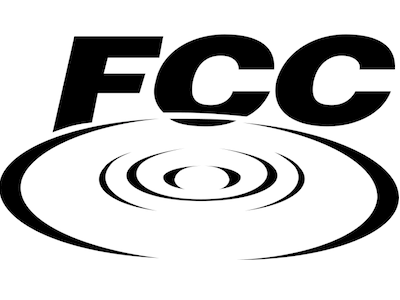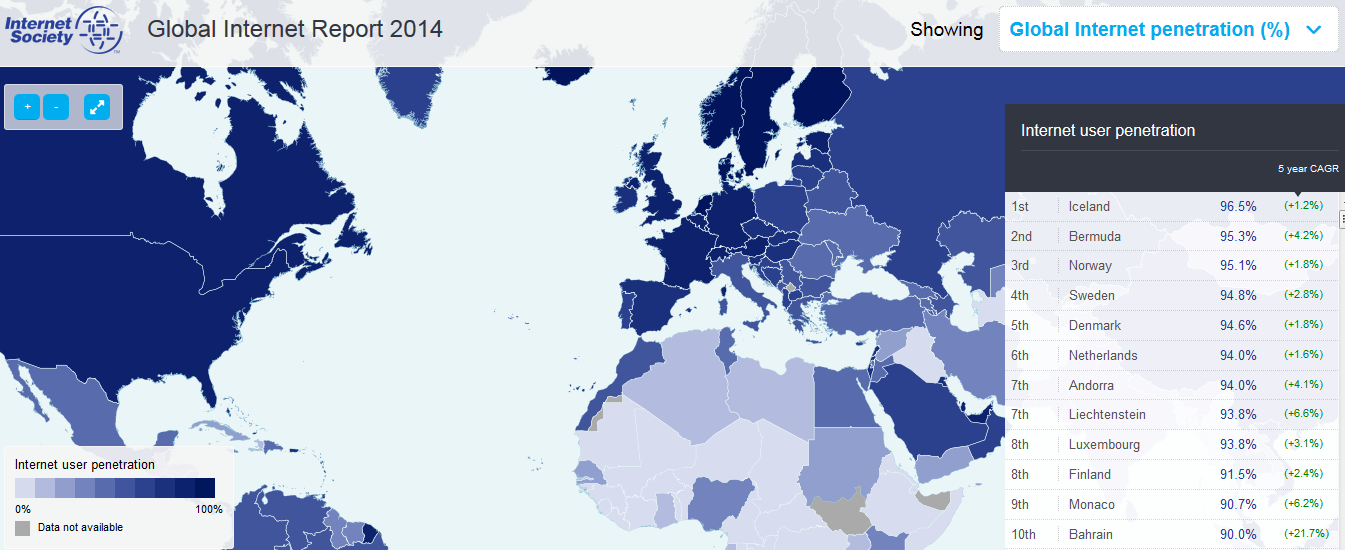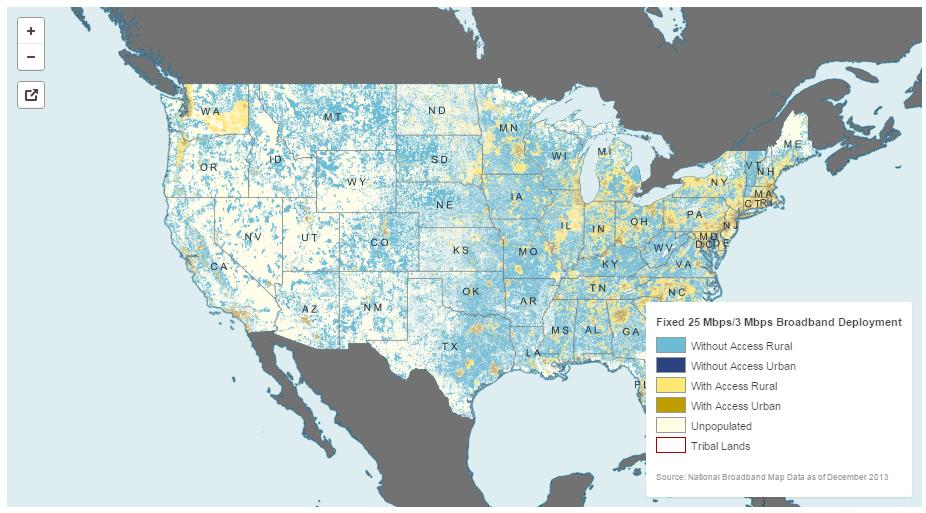FCC Bumps Baseline Broadband Definition To 25Mbps
The FCC just passed a vote to change the definition of "broadband" Internet to a download speed of 25Mbps, up from 4Mbps. The baseline upload speed has tripled, from 1Mbps to 3Mbps.
As a result of this change, the U.S. population without broadband Internet speed has also tripled; it's now at 17 percent, or 55 million Americans. A large number of these people are located in rural areas where half of the population lacks high speed Internet.
The change came today after FCC Commissioner Tom Wheeler spoke in an FCC meeting. Wheeler was adamant about passing the speed change and expressed a desire for pushing Internet speeds to a new level in order to cope with the increasing demands on networks as Internet usage grows ever more demanding. "What is crystal clear to me is that the broadband speeds of yesteryear are woefully inadequate today and beyond," he said.
Fellow FCC Commissioner Jessica Rosenworcel spoke in approval of the broadband increase but felt that stopping with the new 25Mbps download speed wasn't going far enough. "We invented the Internet," she said. "We can do audacious things if we set big goals, and I think our new threshold, frankly, should be 100Mbps. I think anything short of that shortchanges our children, our future, and our new digital economy."
The increase of baseline Internet speeds might come as a shock to some who will now find that they no longer qualify as having "broadband." Although it won't change the performance that users currently experience, this could cause protests against ISPs who previously sold customers a service plan predicated on having "broadband" speeds. If an Internet service contract defines broadband Internet at a speed of under 25Mbps, that's technically no longer broadband.
This should prove beneficial, however, as ISPs who wish to able to market their services as "broadband" will need to increase speeds to the new standard to do so. Some users might even be in for an unexpected speed boost as ISPs make the change to the new speed standard, but this will likely mean an additional charge for anyone not signed up on a contract plan.
"When 80 percent of Americans can access 25[Mbps down]-3[Mbps up], that's a standard. We have a problem that 20 percent can't. We have a responsibility to that 20 percent," said Wheeler. The vote for raising the baseline speed passed with a vote of three in favor of the change and two against. Going by the statements of the FCC Commissioners, it is possible that further efforts to motivate ISPs to raise Internet speeds could follow in the near future.
Get Tom's Hardware's best news and in-depth reviews, straight to your inbox.
The FCC Commissioners appear to want to raise the United States back to being a leader in global Internet rankings. According to a report from the Internet Society, the United States currently ranks as 18th in the world for Internet penetration, only scoring a user penetration of 84.2 percent. Worse yet, the U.S. ranks 30th in average download speed with a rating of 18.47Mbps.
While the new standard will help to improve this score, growing to an average of 25Mbps would still put the United States at 18th, tied with Belgium. This helps to give some insight into Commissioner Rosenworcel's point of view. Changing broadband to a definition of 100Mbps would position the United States as the fastest Internet network in the world. Hong Kong, which currently ranks first in Internet speed, has an average download speed of 57.07Mbps.
Of course, the changes brought by the FCC can help to push American ISPs, but it does not guarantee that they'll actually increase speeds. Many companies might decide that it is cheaper to strike broadband from their literature and continue to sell Internet at the current rates. Although some users may not make use of the increased bandwidth, boosting some areas to broadband speeds could mandate upgrading the network to be able to handle the increased load, which is something not every ISP will be willing to do. Hopefully, with the new standard in place, most ISPs will elect to increase speed without requiring further incentives.
You can see the FCC's interactive broadband deployment map here.
Updated Jan 29, 2:20pm to include note about FCC's broadband deployment map and associated image.
Updated Jan 29, 6:45pm to include a link to the broadcast of the FCC's meeting, which you can access here.
Follow us @tomshardware, on Facebook and on Google+.
Seth Colaner previously served as News Director at Tom's Hardware. He covered technology news, focusing on keyboards, virtual reality, and wearables.
-
This has not been confirmed by the FCC, and the link to the yearly FCC Broadband Report above does not include the word 'vote' or discuss any such vote of any kind.Reply
-
Onus http://www.theguardian.com/business/2015/jan/29/fcc-increases-broadband-speed-thresholdReply
I'd say this is real. I have mixed feelings about it. To the extent that it addresses claims by ISPs that amount to false advertising, I'm in favor. To the extent that setting Internet speeds is not a Government job, I'm opposed to some of the likely effects. Make ISPs accurately report their speeds, but that's it.
-
kenjitamura I sure hope this is real. There are still lots of areas in Salt Lake City where the highest speeds Centurylink provide for their DSL is 7mbps down and 768 kbps up. And they're charging $50 a month for that ridiculously low speed.Reply -
ArgleBargle2015 @celrak: It certainly has. Your search skills suck. http://transition.fcc.gov/Daily_Releases/Daily_Business/2015/db0129/DOC-331760A1.pdfReply -
targetdrone You know what this means righ?. More taxes to get the newly broadbandless subsided service.Reply -
IInuyasha74 In writing our article we used a live broadcast. The video is now available to watch with some documents below.Reply
http://www.fcc.gov/events/open-commission-meeting-january-2015
You can see the vote in the video and has been official passed by the FCC. We just didn't have that listed in the original source because it has just now been posted and was not up for view immediately after the end of the broadcast. -
stevo777 Way to cover up the third most populous state in the nation and a couple of others with the key--brilliant;)Reply -
skit75 So.... you thought you had Broadband huh?Reply
"Incoming pressure wave of air followed by a Slap-CRACK > POW!"
Not anymore you don't ! -
chuge_SO Speed is one thing. Bandwidth caps are another. So that's great that 80% of Americans can reach their caps that much faster, but until we address all aspects of data consumption what have we really accomplished?Reply -
DookieDraws I'm just waiting on the news that Comcast will be significantly dropping the price of their services, especially their Internet service. All those in favor, vote up!!!! :)Reply



